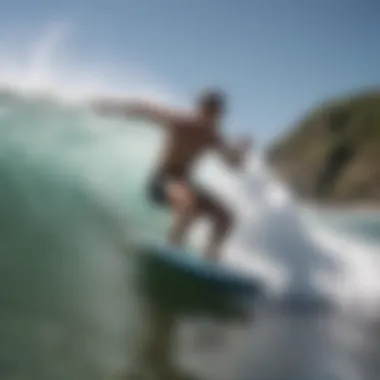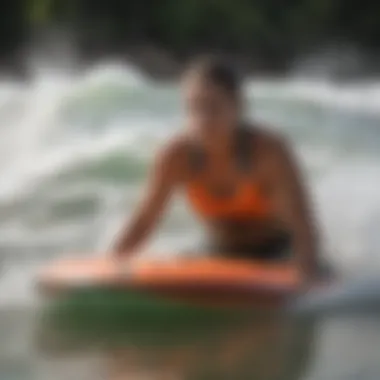The Art and Science of Boogie Boarding: A Deep Dive


Intro
Boogie boarding is more than just a thrilling water activity; it's a blend of art and science that connects enthusiasts with the ever-changing rhythm of the ocean. Imagine skimming the surface of waves, feeling the adrenaline rush as you catch just the right swell. It’s not merely about riding a board; it’s about understanding every variable that the sea offers. From the historical roots of this sport to the intricate techniques that seasoned riders utilize, the journey into the world of boogie boarding reveals insights that both novices and veterans can appreciate.
As we embark on this exploration, it’s critical to acknowledge the evolution of gear that has shaped this experience. The transformation of boogie boards from simple foam creations to sophisticated designs is a testament to innovation in water sports. Yet, with the thrill comes a necessity for safety and awareness—crucial aspects for anyone aiming to enjoy this immersive experience to the fullest.
In this guide, we will traverse the landscapes of boogie boarding, touching on the essential skills needed for success, the environmental nuances to consider, and even the rich community dynamics that fuel this sport. Whether you're new to the surf scene or looking to refine your skills, this article serves as a comprehensive resource that advocates for both excitement and responsibility in equal measure.
Foreword to Boogie Boarding
Boogie boarding, often overshadowed by its more renowned sibling surfing, holds its own charm and excitement. As we dive into this fascinating pastime, it’s essential to recognize how it blends fun with the elements of science and art. Within the context of this article, we’ll explore not only the basics of boogie boarding but also its cultural significance and the evolution over the years. This section serves as a foundation, setting the stage for deeper dives into mechanics, skills, and environmental impacts of this thrilling sport.
Understanding boogie boarding goes beyond just knowing how to ride a wave. It evokes a sense of connection to the ocean and its rhythmic embrace. For many, it's an invigorating escape, a blend of adrenaline and tranquility. Popular among beach-goers of all ages, it requires little more than a board and some ocean enthusiasm. Not only does it cater to thrill-seekers, but it also invites novices and families to join in, making it an accessible sport.
As we get into the nitty-gritty of boogie boarding, we'll look at the mechanics, gear, and trends that have emerged over the years. Recognizing its importance in marine environmental considerations is also pivotal. This sport encourages us to appreciate the ocean while considering our role in preserving it.
Understanding the Basics of Boogie Boarding
Diving into the basic understanding of boogie boarding reveals a tapestry woven with technique, body dynamics, and wave appreciation. At its most fundamental level, boogie boarding involves lying on a soft and flexible board, navigating through waves in a way that requires not only balance but also an acute awareness of the ocean's movements. Most boards range from 36 inches to 48 inches long, catering to varying levels of experience.
To get started, a good boogie board is key. It can make the difference between a thrilling ride and a lackluster attempt at catching waves. Most boards are constructed from soft foam or durable materials, equipped with a slick bottom surface to glide effortlessly through the surf. It’s vital for newcomers to familiarize themselves with these basic tools as they serve as extensions of their own bodies on the water.
Key Points to Consider:
- Balance is crucial; practice shifting your weight correctly.
- Understand tide patterns and how they affect wave behaviors.
- Safety should always be a priority; know local regulations.
The thrill of searching for the perfect wave can feel exhilarating, creating an emotional connection between the rider and the ocean. However, success comes down to understanding your body positioning and timing when it comes to catching those waves.
Historical Context and Evolution
Boogie boarding has an interesting history that stretches back several decades, often rooted in cultures that thrive around coastal living. It was in the late 1970s that boogie boarding rose to prominence, thanks in part to pioneers like Tom Morey, who designed the original boogie board. Morey’s invention transformed a basic concept into a popular pastime, introducing it to a broader audience.
Historically, locals in Hawaii and Polynesian cultures have long enjoyed surfing and riding waves, often using homemade wooden planks. This laid the groundwork for the modern boogie board, which began as an experimental venture by those seeking a simpler, more accessible wave-riding experience. Over the years, its evolution has also showcased technological advancements—boards now utilize a variety of materials and shapes to enhance performance in diverse ocean conditions.
"Boogie boarding is not just a sport; it is a cultural experience that has shifted from a niche activity to a global phenomenon."
In recent years, the sport has continued to grow in popularity; competitions and community events have helped solidify its status as an exciting and respected form of water sport. These developments have also spurred dialogues on sustainability, leading to discussions about minimizing its ecological footprint on coastal ecosystems. Ultimately, the historical journey of boogie boarding serves as a testament to its ability to adapt, thrive, and remain relevant in a rapidly changing world.
The Mechanics of Boogie Boarding
Understanding the mechanics of boogie boarding is crucial for anyone who wants to master the art of riding waves. This part of the guide dives into how the right gear, proper techniques, and body dynamics come together to create an exhilarating experience in the water. Each of these factors contributes significantly to the effectiveness of a ride and the overall enjoyment of this exciting sport.
Equipment Essentials
A good boogie board serves as the foundation for a successful wave-riding experience. But it’s not merely the board itself. Various elements come into play.
- The Board: Most commonly, a boogie board is made of foam with a slick bottom surface, designed for speed and maneuverability. There’s a wide range of thickness and size available, so it’s helpful to find one that fits your weight and height.
- Fins: Adding fins can greatly enhance your control while riding. They help in maintaining speed and provide better stability, especially when making sharp turns.
- Leash: The leash tethers you to the board, ensuring you don’t lose it to the waves. It’s one of those small but essential parts that can prevent unnecessary hassle.
- Wax and Accessories: Don't forget board wax. It’s like clutch in keeping your grip! There are even rash guards or wetsuits—definitely worth considering for comfort and rash prevention.
Each of these components plays a vital role in achieving the desired performance, showing that investing in the right gear can be a game changer.
Techniques for Wave Riding
When it comes to conquering those rolling waves, the techniques you employ often separate the amateurs from the pros. Here are some pivotal strategies to consider:


- Paddle Positioning: Successful wave riding starts with a solid paddling technique. Keep your body aligned and paddle with intention to catch that perfect wave.
- Timing Your Takeoff: The moment you feel the wave lift you, that’s your cue to maneuver. Timing is everything—being too early or too late can cost you the wave altogether.
- Steering: Shift your weight to control the direction of your ride. Leaning back helps accelerate, while leaning forward can slow you down. It’s a bit like dancing with the wave.
- Practice Makes Perfect: Finding the right rhythm doesn’t happen overnight—spending time in the water repeatedly trying these techniques is paramount for improvement.
Body Position and Movement Dynamics
Your body’s positioning on the board significantly influences your ability to ride effectively. Here’s what to keep in mind:
- Lie Down Correctly: Position your body towards the front of the board. This alignment makes it easier to paddle and catch waves. Your chest should be up and feet extended straight behind you.
- Balance and Weight Distribution: Maintain a balanced posture, shifting weight as necessary to maintain equilibrium during rides. A simple adjustment in stance can steer your course on a wave.
- Engaging Your Core: Keeping a strong core will help with overall stability and control. Much like surfing, the dynamics of movement can dictate how well you handle tougher conditions.
How you position your body and move can make or break your experience on the water.
As one delves deeper into the mechanics of boogie boarding, it’s clear that the interdependence of equipment, technique, and body movement creates a complex yet beautifully simple approach to wave riding. Each element works harmoniously, enhancing one’s ability to enjoy this exhilarating sport.
Training and Skill Development
Training and skill development play a critical role in mastering boogie boarding. While the thrill of slicing through the waves sparks an undeniable excitement, understanding the art behind it can elevate one's performance from enjoyable to exhilarating. Each wave presents its own challenge, and honing specific skills prepares riders to adapt and conquer these dynamic elements of nature. In essence, skill development not only enhances technique, but it also fosters a deeper connection with the ocean and the sport itself.
Fundamental Skills for Beginners
For those just dipping their toes into the world of boogie boarding, mastering the basics serves as a solid foundation. First things first, buoyancy control is crucial. Beginners should get comfortable with floating and paddling on their board in shallow waters. Practicing this allows newcomers to gain an intuitive feel for the balance required on the board.
It’s also essential to learn how to position oneself on the boogie board. Starting out, the general rule is to lie on the board with the chest lifted and feet extended towards the back. This form helps maintain stability and maximizes speed when riding a wave.
Next, understanding how to catch a wave becomes a game changer. Timing is key here; one must learn to paddle forward just before the wave lifts the board up to crest. This technique not only avoids wipeouts but also enhances the thrill of the ride.
"The ocean teaches lessons that no instructor can impart."
In addition to these foundational skills, safety awareness is equally important. Knowing how to identify riptides or waves that are too powerful for one’s experience level ensures that novices stay safe while progressing in their skill development.
Advanced Techniques for Experienced Riders
Once the basics are mastered, experienced riders delve into advanced techniques that refine their wave-riding abilities. Bottom turns are among the essential maneuvers. This technique involves making a sharp turn at the bottom of the wave, allowing a rider to maximize speed while positioning themselves for the ride back towards the shore.
Another crucial skill is the tube ride. This is the art of riding inside the wave as it breaks. Successfully navigating a tube requires excellent timing and positioning, as well as quick reflexes to adjust the body’s alignment. Experienced riders often practice this with varying wave types to adapt effectively.
Moreover, incorporating tricks and spins into one’s repertoire becomes an adventurous challenge. Simple tricks such as 180-degree spins or kick-outs not only add flair but also demonstrate skill and confidence. Advanced practitioners often record their sessions to analyze technique and refine their craft further.
Equally important is an understanding of wave dynamics. Knowing when to catch a wave versus when to avoid it can make a significant difference in performance. Adapting to different ocean conditions develops keen observational skills that can significantly enhance a rider's experience.
To continue growing in skill, engaging with the boogie boarding community through local competitions or social media platforms can provide invaluable feedback and inspiration. Rediscovering the passion behind the sport is generally not just about technical prowess but also about fostering a sense of community and sharing waves with fellow enthusiasts.
In summary, training and skill development in boogie boarding encompasses everything from mastering fundamental skills for beginners to honing advanced techniques for seasoned riders. Understanding the dynamics of wave riding and embracing the learning process transforms a simple pastime into a deeply engaging and satisfying sport.
Safety Considerations
When it comes to boogie boarding, safety isn't just a buzzword; it's a vital cog in the wheel of enjoying this exhilarating sport. Engaging with the ocean, while thrilling, comes with its own set of challenges. Thus, understanding the importance of safety considerations can make the difference between a memorable day on the waves and a distressing experience.
Understanding Ocean Conditions
Before heading out, having a solid grip on ocean conditions is crucial. Think of the ocean like a living creature, one that changes moods—sometimes calm, sometimes tempestuous. You need to be aware of the tides, currents, and wave patterns. It’s essential to know that high tide might bring in larger waves, while low tide could expose hidden reefs or sandbars.
- Wave Height: Familiarize yourself with different wave heights and what they mean for your riding experience. A wave that looks inviting from the beach might have hidden dangers in deeper waters.
- Current Awareness: Understanding rip currents can save lives. If you feel the water pulling you out, it's essential to remain calm and swim parallel to the shore until you're out of the current.
- Weather Conditions: Always check the weather before you hit the water. Strong winds can create rough waves, making it difficult for even experienced riders to navigate.
"Knowing the ocean is like knowing an old friend; you understand their quirks, strengths, and weaknesses."
Safety Gear and Protective Equipment


Just as a knight dons armor before heading into battle, boogie boarders need their own protective gear to defend against potential mishaps. While the board is a no-brainer, other accessories can make your experience both safer and more enjoyable.
- Wetsuit: Depending on the water temperature, wearing a wetsuit not only keeps you warm but also provides a layer of protection against abrasions.
- Leash: A sturdy leash is essential. It tethers you to your board, preventing it from drifting away and aiding in safety during wipeouts.
- Swim Fins: These can significantly enhance your paddle power, helping you navigate back to shore more quickly in case of unexpected conditions.
- Safety Whistle: It’s a small addition that can be a lifesaver. In emergency situations where you need to signal for help, having a whistle can alert nearby surfers or lifeguards.
- Protective Surf Socks: These can help prevent cuts from sharp rocks or coral while you're riding the waves.
All said and done, embracing safety is as critical as mastering the art of wave riding. With proper knowledge of ocean conditions and adequate safety gear, both novice and seasoned boogie boarders can enjoy their time in the surf while minimizing risks.
Environmental Impact and Sustainability
The intersection of boogie boarding and environmental stewardship holds significant importance in fostering a sustainable passion for water sports. As participants of this exhilarating activity engage with powerful ocean waves, it becomes crucial to consider how their actions affect the surroundings. Raising awareness about the ecological implications of boogie boarding not only encourages mindful practices but also nurtures a culture that respects and protects coastal environments. In this section, we delve into different aspects of sustainability, shining a light on how enthusiasts can minimize their impact and contribute positively to our precious ecosystems.
Minimizing Ecological Footprint
To truly embrace the spirit of boogie boarding, individuals must align their practice with environmental responsibility. This begins with understanding their ecological footprint, which encompasses the resources utilized and waste generated during sessions at the beach. Practical strategies to lessen this impact include:
- Opting for Eco-friendly Board Materials: When choosing a boogie board, consider options made from biodegradable materials or sustainably sourced foam. Brands like BZ Bodyboards have started using eco-conscious materials that prioritize the environment.
- Responsible Practices: Carry reusable water bottles and snacks in durable containers, avoiding single-use plastics that often end up polluting our oceans. Additionally, practice the concept of 'leave no trace' by cleaning up after yourself—disposing of all trash and recyclables properly.
- Educating Others: Share tips and insights about minimizing ecological footprints within the community. Whether in person or on social media platforms like Reddit or Facebook, spreading the word can make a ripple effect, influencing others to adopt sustainable habits.
Embracing such practices not only enriches the experience of boogie boarding but also contributes to nurturing the Earth's beauty for generations to come.
Preserving Coastal Ecosystems
The rich and diverse ecosystems along our coastlines are crucial not just for boogie boarders but for countless forms of life. These areas serve as habitats for marine species, sands, and coastal vegetation, contributing to biodiversity that underpins ecological health. Preserving these habitats goes hand in hand with engaging responsibly in water sports. Here are key considerations to support this vital cause:
- Respecting Wildlife: When capturing the thrill of riding waves, remember to keep a safe distance from marine animals to avoid disrupting their natural behavior. Many species, including sea turtles and shorebirds, nest along beaches—being mindful can prevent potential harm.
- Participating in Clean-up Initiatives: Joining community efforts for beach clean-ups can significantly remove debris that threatens marine life. This is a hands-on opportunity to positively impact local ecosystems while connecting with fellow enthusiasts.
- Supporting Conservation Organizations: Contributing to or volunteering for organizations focused on coastline preservation can further amplify efforts in sustaining the environment. Groups like Surfrider Foundation lead initiatives aimed at protecting ocean and beach ecosystems.
"Each boogie boarder holds the power to influence the water's health; with every ride, remember to respect the tide."
Popular Boogie Boarding Destinations
When it comes to enjoying the thrill of boogie boarding, pinpointing the best locations can make all the difference. Not only do the right spots enhance the overall experience, but they also play a crucial role in skill development, wave selection, and ensuring safety. Accessible and suitable locations can serve as a nurturing ground for beginners while offering sizable challenges for seasoned riders. This section unveils some essential destinations that cater to different skill levels, enhancing your boogie boarding journey.
Top Locations for Beginners
For those just dipping their toes into the world of boogie boarding, finding gentle waves and a welcoming community is key. Here are some prime spots that cater to new enthusiasts:
- La Jolla Shores, California
This beach is often deemed as the best place for beginners. The sandy bottom and small, manageable waves create a safe environment. Plus, with lifeguards present, it's an added layer of security. - Kailua Beach, Hawaii
Known for its warm waters and consistent waves, Kailua Beach is ideal for beginners. The scenic background only adds to the charm of catching your first wave in paradise. - Mission Beach, California
The soft waves and ample surf schools make Mission Beach an excellent starting point. You'll find plenty of rental shops and instructors who can help you learn the ropes.
These spots not only offer safety and ease but also allow beginners to connect with others who share their newfound passion, fostering a sense of community.
Advanced Spots for the Experienced
Once riders gain confidence and skill, they often seek destinations that offer a bit more bite. Here are a few advanced locations that challenge experienced boogie boarders:
- Pipeline, Oahu
A legendary surf locale, Pipeline offers powerful waves that create hollow barrels. This spot is not for the faint of heart; only experienced riders should attempt to navigate these waters. - Pismo Beach, California
This California gem is known for its unpredictable waves. Experienced riders appreciate the challenges presented by Pismo, pushing them to refine their skills further. - Durban, South Africa
With powerful swells and consistent surf, Durban boasts some of the best beach breaks in the world. Its vibrant waters attract a range of surfers willing to tackle the big waves.
These advanced locations not only test one's skills but also serve to elevate the boogie boarding experience through the complexity and excitement they present.
"Choosing the right destination can transform your boogie boarding adventure; safe for beginners, challenging for pros. Finding that sweet spot enhances everything!"
In summary, whether you're just starting out or seeking to hone your advanced skills, the right location plays a pivotal role in your boogie boarding adventure. Embracing these different environments allows boarders to grow, learn, and enjoy the unique culture each destination has to offer.
Community and Culture
When it comes to boogie boarding, it's not just the thrill of riding the waves that captivates enthusiasts; it's the vibrant community and the rich culture that springs up around this exhilarating sport. The social fabric woven by locals and tourists alike shapes the experience and enhances the sense of belonging among riders. Being part of a community fosters personal growth, encourages skill sharing, and creates lasting friendships. It brings enthusiasts together, igniting a passion that transcends individual experience.


The Boogie Boarding Community
The boogie boarding community is a melting pot of diverse individuals united by a common love for the ocean and excitement of wave riding. From beginners to seasoned pros, the community embraces everyone, creating an inclusive atmosphere. This welcoming spirit sparks camaraderie, where seasoned riders often share their insights and tips, while newcomers bring fresh enthusiasm and perspectives.
Members often congregate at popular beaches, engaging in friendly conversations and exchanging stories over shared experiences. These connections form a support network, nurturing budding talent and inspiring riders to push their limits.
Notably, online platforms like reddit and facebook hosts of forums and groups where people share their journeys, techniques, and seek advice. This digital network enhances the sense of community by fostering interactions beyond the beach. Such connections are invaluable; they provide a wealth of knowledge and encourage growth within the sport.
Events and Competitions
Events and competitions play a crucial role in solidifying the boogie boarding culture. Ranging from local gatherings to international contests, these events magnetize boogie boarders from all walks of life. They offer an electrifying atmosphere where skills and styles are showcased, and friendships are forged.
Many competitions emphasize not just skill but also creativity. For example, the International Boogie Boarding Association organizes events that encourage innovative moves and tricks, rewarding those who dare to think outside the box.
The competitive scene fosters an environment of motivation and inspiration, pushing riders to hone their techniques while enjoying the thrill of competition.
Moreover, such events create awareness about the sport, attracting more enthusiasts and encouraging newcomers to take part. Participants often find themselves invigorated by the energy of fellow competitors, creating a unique blend of rivalry and camaraderie that makes the experience unforgettable.
"The best part about competing isn’t just winning—it's the thrill of being surrounded by like-minded individuals who share the same passion."
—Anonymous Rider
In summary, the community and cultural aspects of boogie boarding extend beyond just riding waves. They are about connection, shared experiences, and mutual growth. As the sport continues to evolve, these elements remain integral, ensuring that boogie boarding is as much about building lasting relationships as it is about the thrill of mastering waves.
Gear Review and Recommendations
When it comes to boogie boarding, the right gear isn't just a luxury; it's a necessity. Choosing the proper equipment can elevate your experience on the waves, keeping you safe and enhancing your performance. In this section, we’ll explore how to choose the right board and what accessories can amplify your boogie boarding sessions.
Choosing the Right Board
Selecting the right boogie board is akin to picking a trusty steed for an adventure. Each rider is unique, much like how no two waves are the same. Factors like your weight, skill level, and the surf conditions play pivotal roles in determining which board aligns best with your needs.
- Materials Matter: Boogie boards could be made out of different materials like foam, polyethylene, or even fiberglass. Foam boards, being softer, are fantastic for beginners, while fiberglass boards are known for speed and are excellent for experienced riders.
- Thickness and Size: Generally, thicker boards offer more buoyancy and can handle heavier riders, whereas thinner ones are more maneuverable. A common mistake is to underestimate the board size; a board too small can lead to struggling with balance and catching waves.
- Tail Shape: The tail of the board influences how it performs in the water. A crescent tail usually offers more control, while a square tail provides stability and speed. Think about your riding style—do you prefer quick turns or stable rides?
Finding the right board may take some trial and error, but it’s all part of the journey toward mastering the art of boogie boarding. Don’t hesitate to ask veteran riders or experienced sellers for advice, as their insights can be invaluable.
Accessories for Enhanced Performance
While the board itself is crucial, the right accessories can significantly improve your overall experience. These tools not only enhance your performance but also ensure you stay comfortable and safe out there on the waves.
- Swim Fins: A good pair of swim fins makes a world of difference, especially when paddling back out. They help you conserve energy and increase your speed, allowing you to catch waves more easily.
- Board Leash: It's tempting to think you can just hang on tight to your board, but a leash is a must-have. It keeps your board tethered to you, preventing it from drifting away after a wipeout. Safety first!
- Wax: If you aim to improve grip on your board, consider using wax. Applying it regularly helps create friction between your skin and the board, making it easier to hold on when the wave pushes you around.
- Protective Gear: Although it might sound overboard, wearing a wetsuit or vest protects you from the cold and from any potential scrapes. Different regions can have varying water temperatures, so ensure you have the appropriate gear for your location.
- Water-Camera: If you want to capture your feats or share with friends on social media, a waterproof camera can be a fun addition to your gear, allowing you to document your adventures.
"The right gear can turn the tide in your favor, enhancing both your confidence and your capability on the water."
By focusing on the right board and accessories, you'll set yourself up for success. Just remember, the best gear is what makes you feel comfortable and enhances your skills, no matter if you are just catching your first wave or zooming through powerful swells.
Closure
The conclusion of this exploration into boogie boarding serves as a pivotal moment, where the insights gathered throughout the article come together to paint a full picture of this exhilarating sport. Understanding the breadth and depth of boogie boarding not only highlights its rich history and cultural dynamics, but also frames it within the context of modern ecological consciousness and community spirit.
As wave riders and enthusiasts, we must consider the future of boogie boarding — not just in terms of techniques and equipment, but also in how we engage with the environment. Safety, sustainability, and community are essential pillars that should guide every action we take, whether it’s at the beach or while participating in events.
Reflecting on the importance of these elements includes:
- Protecting Coastal Ecosystems: Boogie boarding offers a thrilling experience, but it's vital to remember our responsibility to the ocean and beach environments. Understanding local ecosystems and minimizing our footprints should be a priority for the next generation of riders.
- Adapting to Changing Conditions: As climate change affects ocean conditions, staying informed and adjusting our practices will be crucial for sustaining the sport we love.
- Connecting with the Community: The bond amongst boogie boarders is a unique tapestry woven of shared experiences, camaraderie, and mutual support. Events and competitions can help strengthen these connections, encouraging newcomers to join in and learn from seasoned riders.
The journey of boogie boarding is far from static. As new innovations emerge and the community grows, we are all called to contribute to its evolution. Let’s keep riding the waves, ever cognizant of what the future holds, while relishing in the joy and freedom that boogie boarding brings.
The Future of Boogie Boarding
As we look ahead, the future of boogie boarding is as vibrant and dynamic as the waves we ride. There are several exciting trends and considerations on the horizon:
- Technological Advancements: Just like any sport, technology continues to shape how we experience boogie boarding. From advanced board materials designed for durability and performance to wearables that enhance safety, innovation could significantly impact how enthusiasts engage with the sport.
- Growing Global Community: With the increasing interest in water sports across the globe, more riders are joining the community. This influx brings diverse perspectives and techniques which can enrich our understanding of the sport and its practices.
- Emphasis on Sustainability: As eco-consciousness grows, boogie board manufacturers are looking to invest in environmentally friendly practices. The potential for recyclable materials in boards or eco-friendly wetsuits could revolutionize gear production.















